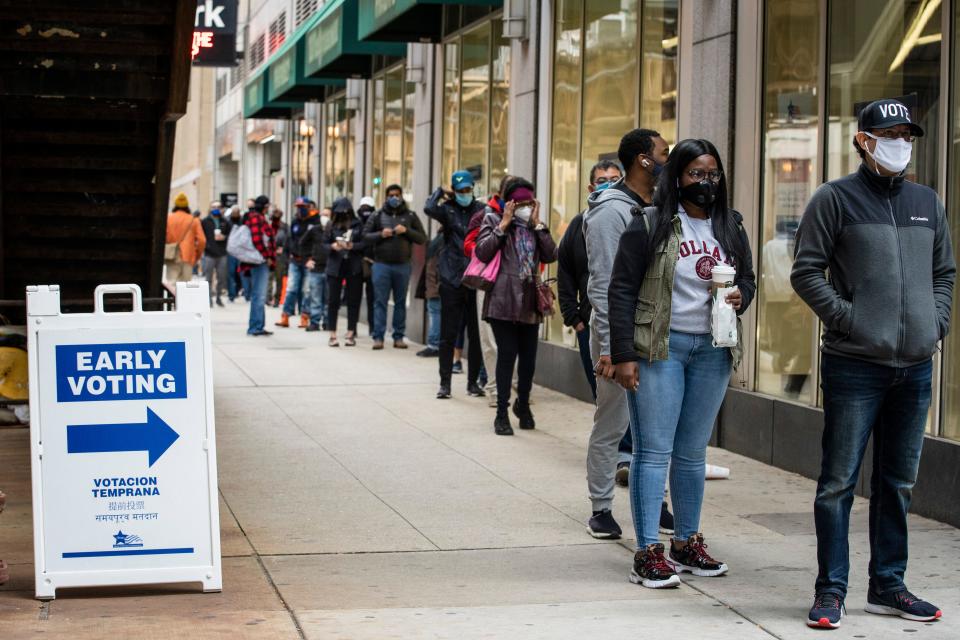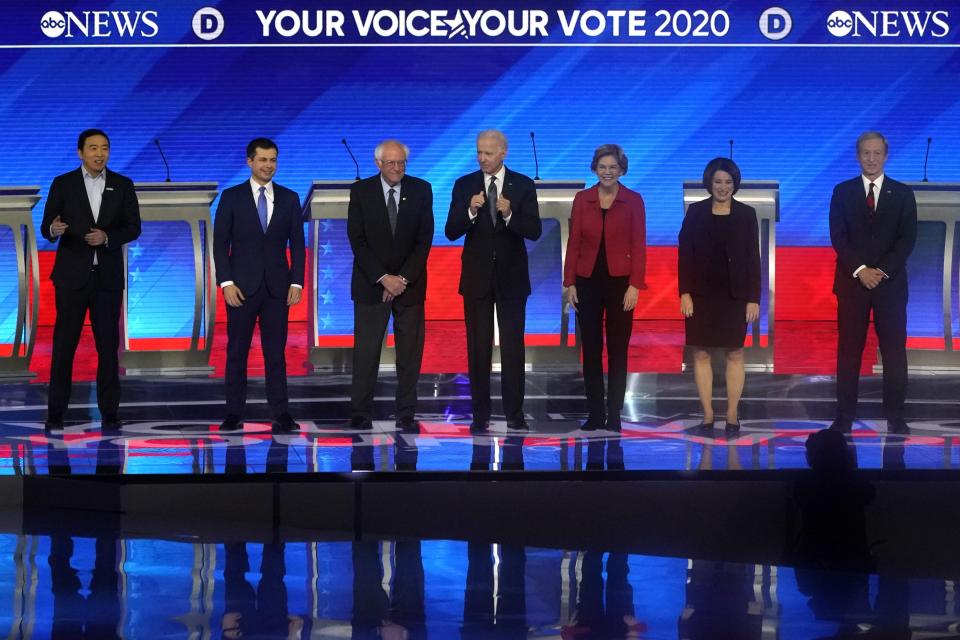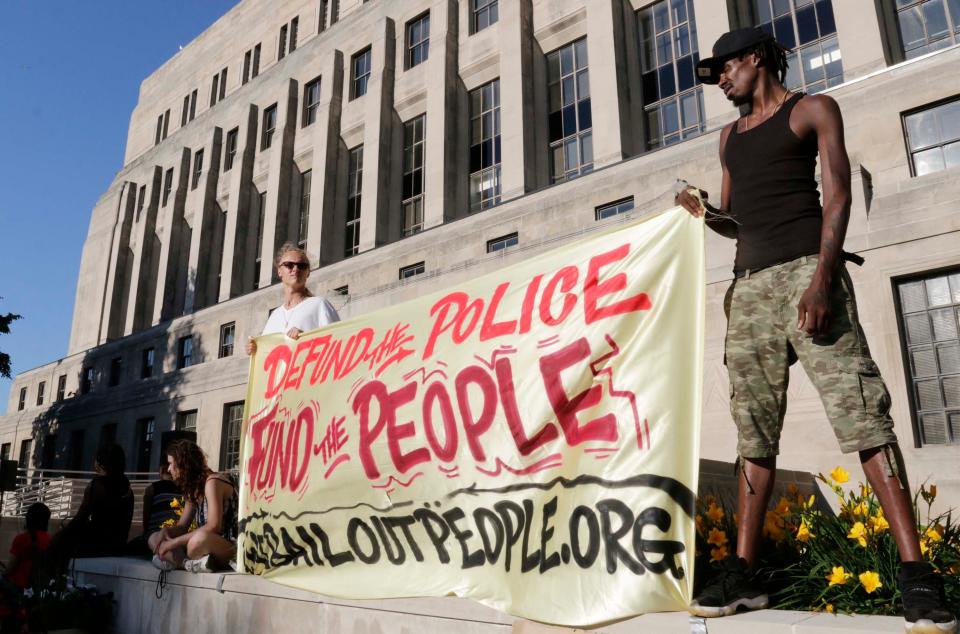'We're not a monolith': Democratic 2020 autopsy sends warning about outreach to voters of color
- Oops!Something went wrong.Please try again later.
Democrats shouldn't expect the racially diverse coalition who helped defeat former President Donald Trump and win the Senate to automatically show up in the next nationwide election.
Black, Hispanic and Asian voters may have loathed Republicans, according to a major review of the 2020 election cycle, but they still need to be convinced to show up to the polls, and Democrats lacked a core argument about the economy or returning the country to normal in the wake of the coronavirus pandemic.
"We have to be very fine tuned in the way that we talk to our electorates," Nathalie Rayes, president and CEO of Latino Victory Fund, one of the three groups that commissioned the report, told USA TODAY.
"We keep pulling down the fact that we're not a monolith — not only Latinos, not only Asians, not only Blacks — we have a different spectrum of things that will drive us to the voting booth."

As a result of the messaging issues, the report argues, Republicans were able to blunt at least a dozen Democratic wins last year by anchoring liberal candidates to more far-left ideas, such as the defund police movement.
"In the absence of strong party branding, the opposition latched on to GOP talking points, suggesting our candidates would 'burn down your house and take away the police,' " the report says.
But the report also argued that Democrats should lean into issues surrounding racial justice, rather than back away from them.The six-month study — compiled by the centrist think tank Third Way, along with Latino Victory Fund and Collective PAC, which promote Black and Latino candidates — is the most extensive autopsy released by either party since the presidential contest.
It argues that even in victory, Democrats need to undertake serious fixes ahead of the 2022 midterm elections, which could eliminate the small majorities the party holds in Congress.
The study, first reported by the New York Times, specifically warns Democrats not to treat people of color as a monolith, or as just the party's base which simply needs to be mobilized. Instead, Democrats needs to look at racial minorities as "persuasion voters" who first need to be inspired with specific policies and messages.
National strategy, for instance, failed to take into account regional and local differences, such as socioeconomic status or country of origin when dealing with Latino voters, the study says.
Rayes said the post-mortem creates a map for party leadership on how to spend resources to target those key constituencies. She said the drop-off in turnout among those voters noted in the report is directly tied to Democrats making "minuscule investments" in down-ballot candidates in 2020.
"We are tired of asking for what should be spent in communities of color," Rayes said. "You know, it is exhausting and it is draining. We're only trying to help progressive people run and win and be effective, and it takes investment."

'Defund the police' and too much 'anti-Trump' talk? Campaigns say Dems lacked message
The report examined roughly three-dozen 2020 congressional races across the country using polling, turnout data and about 150 interviews with candidates, campaign staff and leaders of allied organizations.
One of its biggest 2020 takeaways was that Democrats failed to provide voters with a clear and concise argument for why they should win. Instead liberals and their allies relied "too heavily on anti-Trump rhetoric" without harnessing a strong economic frame of their own.
"Some campaign teams we spoke with felt that the party didn’t have a message beyond 'Donald Trump sucks'," said veteran Democratic strategists Marlon Marshall and Lynda Tran, who authored the report.
The lack of a pro-Democratic message left a void that allowed split voting for Biden at the top of the ticket and Republican candidates down ballot in at least 16 congressional district races, the report found.
That also gave GOP candidates a window to seize a narrative with attacks related to "radical socialists" or "defund the police" based on the series of national protests last summer around controversial police shootings of African Americans.
Congressional races that saw attack ads by Republicans pummeling Democrats with a drumbeat of "law and order" or "socialism" saw a higher share of people of color voters supporting the GOP candidate, according to the report. None of the candidates included in the report's analysis supported defunding the police, but the study says nearly all were targeted with paid attack ads claiming they did.
That issue has sparked an internal debate among Democrats for months, with moderates blaming more activist-minded or progressive national figures for going too far to the left.
"Look, there are people in the Democratic coalition who think we should literally dismantle police departments and not have them," political strategist Matt Bennett, a Third Way co-founder, said in an interview Monday.

"That is very unpopular with all kinds of voters, including I would say in some cases, especially voters of color do not want that."
Bennett said the report's findings make it clear that when asked about specific policy components, such as eliminating qualified immunity for bad police officers; having mental health professionals work with police; or ending the militarization of local law enforcement, most Democrats and their swing voter allies supported those ideas.
"The stuff that is actually in the big bills that are actually moving in Congress, those things are popular," he said. "The problem with defund the police was not the policy, it was the slogan."
Democrats must be 'unapologetic about race'
Bennett admits it is a tricky balance between not alienating left-wing voters who argue they would show up in larger numbers if Democratic candidates leaned into those ideas rather than ran away from them.
"Republicans are better at rage than we are — they just are," he said. "Not on the street level or activists, but our politicians are not."
Democratic hopes in the 2022 mid-terms have hinged largely on the country seeing a strong economic recovery from COVID-19. But the study didn't waiver from a larger lesson about what worked and what failed for Democrats in last year's campaigns.
Throughout the analysis, the most-cited challenge, apart from the pandemic, was the party's inability or unwillingness to address racial justice issues head-on.
"The Democratic Party needs to be unapologetic about race," the report says. "And we need to explain to all Americans why doing so is beneficial to everyone."
Kevin Olasanoye, national political and organizing director for Collective PAC, which focuses on Black candidates, told USA TODAY that rather than blanketing voters with certain messages or slogans, the report should be a guiding light to Democrats about the need to define themselves first, and that avoiding race or diversity is a perilous choice.
"Democrats don't do as good a job in my opinion of playing offense on some of these issues," Olasanoye said.
The report spotlighted that Black voters made the difference in top races across important states, but Democrats failed to mobilize those voters at the same rate that Republicans did white voters.
In the North Carolina Senate race, Black voters grew their share of the electorate in 2020 and saw increased turnout over 2016, but the GOP also saw a slight improvement among Black rural/exurban voters.
The report said Democratic campaign operatives were aware that if it wasn't "defund police" or "socialism" Republicans would have found another racial dog whistle to paint Democrats as out of touch.
"The truth of the matter is like, where the party as a whole is way too much on its heels," Olasanoye said. "So in my opinion, if we're looking prospectively at what we should be doing, I think the answer is there was a national reckoning on race less than a year ago, and Democrats have to define who they want to be on the solutions part of that debate."
This article originally appeared on USA TODAY: Election report sends Democrats warning on outreach to voters of color

